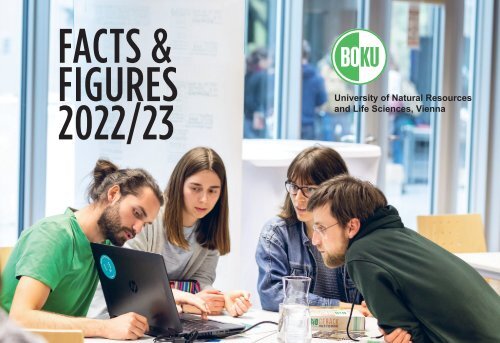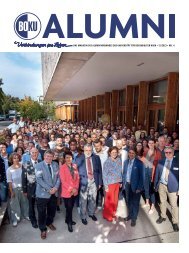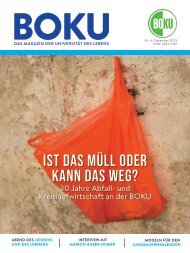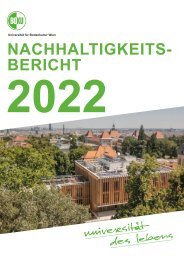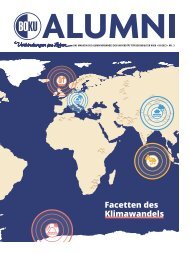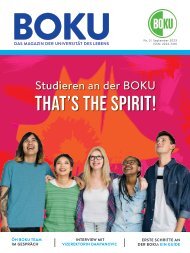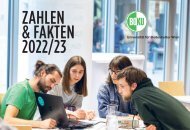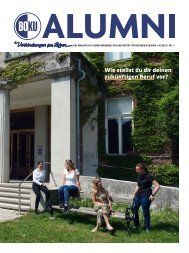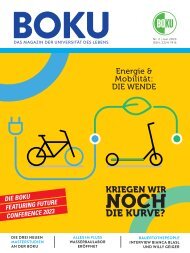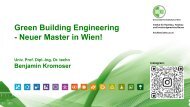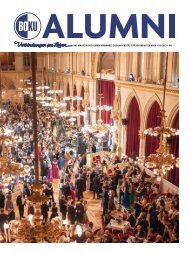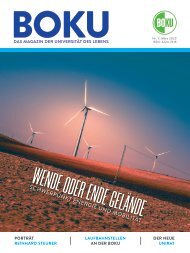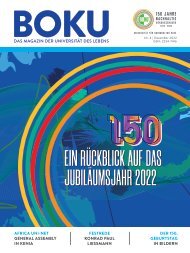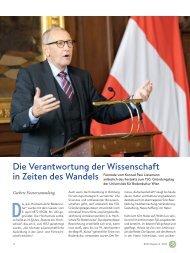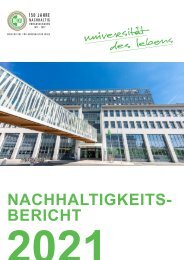Facts & Figures 2022/23
The current edition of the "Facts & Figures 2022/23" of the University of Natural Resources and Life Sciences Vienna is here! The compact brochure offers a comprehensive overview of the most important key figures and information on studies, students, research, cooperations and infrastructure. We wish you an interesting read.
The current edition of the "Facts & Figures 2022/23" of the University of Natural Resources and Life Sciences Vienna is here! The compact brochure offers a comprehensive overview of the most important key figures and information on studies, students, research, cooperations and infrastructure. We wish you an interesting read.
Create successful ePaper yourself
Turn your PDF publications into a flip-book with our unique Google optimized e-Paper software.
FACTS &<br />
FIGURES<br />
<strong>2022</strong>/<strong>23</strong><br />
University of Natural Resources<br />
and Life Sciences, Vienna<br />
1
from left to right:<br />
Gerhard Mannsberger<br />
Vice Rector for Human<br />
Resources, Organisation,<br />
and Digitisation<br />
Nora Sikora-Wentenschuh<br />
Vice Rector for Finance<br />
and Infrastructure<br />
2<br />
Eva Schulev-Steindl<br />
Rector<br />
Doris Damyanovic<br />
Vice Rector for Teaching,<br />
Continuing Education,<br />
and Students<br />
Christian Obinger<br />
Vice Rector for Research<br />
and Innovation<br />
“No other university researches,<br />
teaches, and lives sustainability the<br />
way BOKU does. That‘s what makes<br />
this university unique and that is<br />
our mission.”<br />
© Lisi Specht
BOKU: AUSTRIA’S LEADING<br />
LIFE SCIENCES UNIVERSITY<br />
FOUNDED: 1872<br />
UNIVERSITY ORGANISATION: G RESEARCH, TEACHING<br />
SCIENTISTS: G 2,166 ( 1 43.8%)<br />
STUDENTS: G 10,042 ( 1 52.8%)<br />
GRADUATES: G 1,396 ( 1 52.8%)<br />
GENERAL STAFF: G 827 ( 1 58%)<br />
Climate change, resource scarcity,<br />
biodiversity conservation, food security:<br />
The big questions of the future need<br />
answers. The field of science must address<br />
the problematic areas of politics, economics,<br />
management and NGOs today and find<br />
solutions which are understandable,<br />
relevant, and usable. BOKU is the only<br />
university in Austria which has devoted all its<br />
research and teaching to the Life Sciences.<br />
BOKU unique<br />
Every degree programme at BOKU<br />
combines natural sciences and<br />
engineering with economic and social<br />
sciences. This holistic approach<br />
to problems is unique.<br />
3
4<br />
In 2015, the UN member states adopted 17 Sustainable Development Goals (SDGs) which aim<br />
to make our world a better place to live in by 2030.
6 BOKU COMPETENCE AREAS<br />
RESEARCH<br />
ECOSYSTEM MANAGEMENT<br />
AND BIODIVERSITY<br />
AGRICULTURAL PRODUCTION<br />
AND FOOD<br />
RENEWABLE RAW MATERIALS<br />
AND NEW TECHNOLOGIES<br />
BIOTECHNOLOGY<br />
LANDSCAPE, WATER, HABITAT<br />
AND INFRASTRUCTURE<br />
RESOURCES AND<br />
SOCIAL DYNAMICS<br />
Sustainable development would hardly be conceivable<br />
without our current scientific knowledge. Research in the<br />
field of sustainability develops understanding, identifies<br />
issues, helps analyse relationships, and develops<br />
solution-focused principles for our time. The scientific<br />
work at BOKU is carried out in six competence areas,<br />
which are handled by the 15 departments in a highly<br />
interdisciplinary manner with solid foundations.<br />
In the course of its sustainability strategy, BOKU fills the<br />
“Agenda 2030” with life: in research, teaching, and in<br />
everyday university life.<br />
BOKU vision<br />
The University of Natural Resources and Life Sciences,<br />
Vienna is the only university in Austria able<br />
to continuously work on entire sustainable value<br />
chains – from production to consumption to disposal.<br />
5
15 DEPARTMENTS 3 SCIENTIFIC CENTRES<br />
Material Sciences and Process Engineering<br />
Biotechnology<br />
Water, Atmosphere, Environment<br />
Bionanosciences<br />
Chemistry<br />
Integrative Biology and Biodiversity Research<br />
Food Science and Technology<br />
Landscape, Spatial and Infrastructure Sciences<br />
Economics and Social Sciences<br />
Sustainable Agricultural Systems<br />
Civil Engineering and Natural Hazards<br />
Forest and Soil Sciences<br />
Crop Sciences<br />
Agrobiotechnology, IFA-Tulln<br />
Applied Genetics and Cell Biology<br />
G Centre of Agricultural Sciences<br />
G Centre for Bioeconomy<br />
G Centre for Global Change and<br />
Sustainability<br />
7 CHRISTIAN DOPPLER LABORATORIES<br />
Management:<br />
G Sediment Research and Management<br />
G Growth-Decoupled Protein Production<br />
in Yeast<br />
G Production of Novel Biopharmaceuticals<br />
in E. coli<br />
G Innovative Immunotherapeutics<br />
G Meta Ecosystem Dynamics in Riverine<br />
Landscapes<br />
Module management:<br />
G Next generation CAR T cells<br />
G Molecular Informatics in the Biosciences<br />
6
4 K+ ZENTREN GMBH<br />
G FFoQSI – Feed and Food Quality Safety<br />
and Innovation<br />
G ACIB – Austrian Centre of Industrial<br />
Biotechnology<br />
G Wood K Plus Kompetenzzentrum Holz GmbH<br />
G BEST – Bioenergy and Sustainable<br />
Technologies GmbH<br />
8 BOKU CORE FACILITIES<br />
G Biomolecular & Cellular Analysis<br />
G Food & Bio Processing<br />
G Multiscale Imaging<br />
G BioIndustrial Pilot Plant<br />
G Mass Spectrometry<br />
G Analysis of Lignocellulosics<br />
G Bioinformatics<br />
G Bioactive Molecules –<br />
Screening and Analysis<br />
... and<br />
the research<br />
location<br />
WasserCluster<br />
Lunz in Lower<br />
Austria<br />
SCIENTIFIC PERFORMANCE<br />
G 1,080 ongoing research projects<br />
G EUR 63.7 million R&D revenue<br />
G 1,048 publications in SCI-listed journals,<br />
741 of which with international co-authors<br />
G 2,111 scientific lectures<br />
G 26 patents pending<br />
EARLY CAREER RESEARCHERS<br />
G 3 ERC Starting Grants<br />
G 1 ESPRIT-Programme<br />
G 2 Hertha-Firnberg-Programmes<br />
G 6 Lise-Meitner-Programmes<br />
boku.ac.at/en/fos<br />
7
8<br />
Student Advisory Service:<br />
boku.ac.at/en/boku4you/<br />
themen/studienwahlberatung
7 BACHELOR’S PROGRAMMES TEACHING<br />
G Food Science and Biotechnology<br />
G Forestry<br />
G Wood and Fibre Technology<br />
G Environmental Sciences and Civil Engineering<br />
G Landscape Architecture and Landscape Planning<br />
G Environment and Bio-Resources Management<br />
G Agricultural Sciences<br />
The challenges and problems of our time are<br />
interconnected in various ways and can only be<br />
solved in an inter- and transdisciplinary manner.<br />
Thanks to the 3-pillar principle in teaching, BOKU<br />
students gain the ability to develop solutions which<br />
will meet the ecological, technical and economic<br />
demands of today – as is expected by future<br />
leaders.<br />
boku.ac.at/boku4younow<br />
3-PILLAR PRINCIPLE AT BACHELOR’S (6 SEMESTERS) 180 ECTS<br />
25% 25% 25% 25%<br />
Natural<br />
Sciences<br />
Technology<br />
and Engineering<br />
Sciences<br />
Economics and<br />
Social Sciences<br />
+<br />
Subject-specific<br />
content<br />
BOKU vision<br />
With a technical focus on teaching in the areas<br />
of “protection and improvement of livelihoods”,<br />
“management of natural resources”, “ensuring<br />
nutrition and health”, and “sustainable social<br />
and technical dynamics”, BOKU has a clear position,<br />
unique in the Austrian university landscape.<br />
9
35 MASTER’S PROGRAMMES<br />
German Master programmes<br />
G Wildlife Ecology and Wildlife Management<br />
G Food Science and Technology<br />
G Landscape Architecture and Landscape Planning<br />
G Phytomedicine<br />
G Forest Sciences<br />
G Wood Technology and Management<br />
G Environment and Bio-Resources Management<br />
G Civil Engineering and Water Management<br />
G Plant Sciences<br />
G Livestock Sciences<br />
G Agricultural and Food Economy<br />
G Material and Energetic Exploitation of Renewable<br />
Raw Materials (NAWARO – also possible<br />
internationally*)<br />
G Alpine Natural Dangers / Watershed Regulation<br />
G Viticulture, Enology and Wine Economics*<br />
boku.ac.at/en/master-programmes<br />
NEW<br />
NEW<br />
NEW<br />
English Master programmes<br />
G Biotechnology<br />
G Mountain Forestry<br />
G Water Management and Environmental<br />
Engineering<br />
G Applied Limnology<br />
G European Master in Animal Breeding and<br />
Genetics (National degree)<br />
G Organic Agricultural Systems and Agroecology<br />
(AgrEco-Organic) and Organic Agricultural<br />
Systems and Agroecology (EUR-Organic*)<br />
G Green Chemistry**<br />
G Climate Change and Societal Transformation<br />
G Green Building Engineering<br />
International Master programmes*<br />
G Natural Resources Management and Ecological<br />
Engineering<br />
G Limnology & Wetland Management<br />
G Environmental Sciences – Soil, Water and<br />
Biodiversity (ENVEURO)<br />
G Animal Breeding and Genetics (Joint Degree)<br />
G Safety in the Food Chain<br />
10<br />
* International degree programme (in cooperation with foreign universities) ** Admission at the Vienna University of Technology
G DDP MSc European Forestry<br />
G Horticultural Sciences<br />
G Material and Energetic Exploitation of<br />
Renewable Raw Materials (NAWARO) –<br />
International Master programme Biomass<br />
Technology<br />
G International Master’s in Soils and Global<br />
Change (IMSOGLO)<br />
G Viticulture, Enology and Wine Economics<br />
G Sustainability in Agriculture, Food<br />
Production and Food Technology in<br />
the Danube Region<br />
G Erasmus Mundus Master Programme<br />
in Plant Breeding (emPLANT+)*<br />
G Organic Agricultural Systems and<br />
Agroecology (EUR-Organic*)<br />
3-PILLAR MASTER’S PRINCIPLE<br />
(4 semesters) 120 ECTS<br />
12 DOCTORAL PROGRAMMES<br />
G Social and Economic Sciences<br />
G Natural Resources and Life Sciences<br />
G Biomolecular Technology of Proteins (BioToP)<br />
G Advanced Biorefineries: Chemistry and<br />
Materials (ABC & M)<br />
G Bioprocess Engineering (BioproEng)<br />
G Human River Systems in the 21st Century (HR21)<br />
G Transitions to Sustainability (T2S)<br />
G AgriGenomics<br />
G Biomaterials and Biointerfaces (BioMatInt)<br />
G Build like Nature: Resilient Buildings, Materials<br />
and Society (Build.Nature)<br />
G Hazards and Risks in Alpine Regions under<br />
Global Change (HADRIAN)<br />
G Social Ecology (DSSE)<br />
15% 15% 15% + 55%<br />
boku.ac.at/en/doctoral-studies<br />
Natural<br />
Sciences<br />
Technology<br />
and Engineering<br />
Sciences<br />
Economics<br />
and Social<br />
Sciences<br />
Subject-specific<br />
content<br />
11
„KIPPPUNKTE”<br />
DIE FESTREDE<br />
VON OLGA FLOR<br />
„COOLE UNI“:<br />
BARBARA STÖCKL<br />
IM INTERVIEW<br />
Nr. 2 | Juli <strong>2022</strong><br />
ISSN: 2224-7416<br />
EPICUR<br />
ZU GAST<br />
AN DER BOKU<br />
ON THE<br />
CUTTING EDGE<br />
It is these main topics<br />
which make BOKU so relevant<br />
to the public:<br />
BOKU IN EXCHANGE WITH SOCIETY<br />
BOKU<br />
DAS MAGAZIN DER UNIVERSITÄT DES LEBENS<br />
G Climate Consequences,<br />
Environmental and Natural<br />
Risks<br />
UNIVERSITÄT<br />
FÜR<br />
EINELEBENSWERTE<br />
ZUKUNFT<br />
DIE<br />
DIE FEATURING FUTURE CONFERENCE ZUM 150. GEBURTSTAG<br />
G Bioeconomy of Renewable<br />
Raw Materials<br />
G Social, Environmental and<br />
Geology-Focused Long-Term<br />
Research<br />
G Digitalisation in Agriculture<br />
and Forestry<br />
G Habitat of the Future<br />
G Food and Health Security<br />
BOKU in the media.<br />
Media coverage of<br />
BOKU has increased<br />
11.2% online, 3.3%<br />
in print, and 22.4%<br />
in TV & radio over<br />
the last year. Top<br />
issues in <strong>2022</strong>:<br />
Climate, environment,<br />
energy, water, and<br />
sustainability.<br />
Social Media. On<br />
Instagram, Facebook,<br />
Twitter, LinkedIn,<br />
and Tiktok, BOKU is<br />
promoting scientific<br />
discourse on sustainability<br />
– also among<br />
the non-scientific<br />
community – and<br />
provides realistic<br />
images of a futureorientated<br />
university.<br />
BOKU magazine. Since<br />
2020, BOKU magazine<br />
has appeared<br />
as a special issue<br />
depicting the diversity<br />
of our own research<br />
and teaching on<br />
socially relevant topics,<br />
thus providing a platform<br />
for discourse<br />
with the public.<br />
12
THIRD MISSION<br />
Lange Nacht der<br />
Forschung * . In <strong>2022</strong>,<br />
in addition to its own<br />
3 locations Türkenschanze,<br />
Muthgasse<br />
and Tulln, BOKU also<br />
participated in 3 locations<br />
in the centre of<br />
Vienna: the “Aula der<br />
Wissenschaften”, the<br />
“Building of Tomorrow”,<br />
and on Maria-<br />
Theresien-Platz.<br />
Consulting &<br />
Knowledge Network.<br />
Thanks to our<br />
not-for-profit status<br />
as a university<br />
institution, BOKU<br />
guarantees independent<br />
and sciencebased<br />
information<br />
for society, politics,<br />
and business.<br />
klimaneutralität.boku.<br />
ac.at/en/<br />
Citizen Science.<br />
Due to Citizen<br />
Science, everyone<br />
has the opportunity<br />
to get involved in<br />
science. The<br />
research offers<br />
currently available<br />
can be found on the<br />
“Österreich forscht”<br />
[Austria researches]<br />
platform coordinated<br />
by BOKU.<br />
Featuring future.<br />
“Featuring Future” is the<br />
slogan heading the University<br />
of Natural Resources and Life<br />
Sciences, Vienna’s celebration<br />
of its 150 th anniversary in <strong>2022</strong>.<br />
Highlights of the anniversary<br />
programme were the kick-off<br />
event, a two-day Featuring<br />
Future Conference in the<br />
Sciences Auditorium with a<br />
gala evening in the Hofburg,<br />
a Togetherness Festival on<br />
the BOKU campus and,<br />
finally, the official ceremony.<br />
short.boku.ac.at/150years<br />
* Long Night of Research<br />
13
BOKU INTERNATIONAL RELATIONS<br />
Partner universities<br />
Partner universities<br />
(Erasmus+, CEEPUS, joint<br />
study and other agreements)<br />
Partner universities of the<br />
international BOKU master’s<br />
programmes<br />
EPICUR Alliance<br />
Study abroad is an important opportunity<br />
for staff and students to develop<br />
their skills and expertise. Currently,<br />
25.7 percent of BOKU students come<br />
from the EU and third countries, while<br />
21 Master‘s and 12 doctoral programmes<br />
can be completed entirely in English<br />
(cf. pages 10–11). Thanks to its longterm<br />
participation in EU programmes<br />
such as Erasmus+ and its expertise,<br />
BOKU was also able to qualify as one<br />
of the first European Universities with<br />
EPICUR.<br />
14<br />
BOKU maintains <strong>23</strong> agreements in<br />
the form of network memberships<br />
and around 360 multi- and bilateral<br />
partnerships and cooperation agreements<br />
with universities and research<br />
institutions – 270 of which in Europe<br />
and 90 worldwide.
INTERNATIONALLY IMPORTANT<br />
BOKU NETWORKS<br />
INTERNATIONAL<br />
European Partnership for an Innovative Campus Unifying Regions (EPICUR): BOKU is part of<br />
a European University Network together with the Universities in Strasbourg, Mulhouse, Freiburg,<br />
Amsterdam, Poznan, Thessaloniki, the University of Southern Denmark, and the Karlsruhe Institute<br />
of Technology.<br />
Association for European Life Sciences Universities (ICA) and ICA-CASEE: an association<br />
of more than 60 European life science universities; ICA-CASEE has a focus on Central and South-<br />
Eastern Europe (BOKU is on the board of both networks).<br />
Euroleague for Life Sciences (ELLS): As part of this network for<br />
joint teaching and learning projects, student exchanges, and<br />
quality assurance, 7 joint master’s programmes are offered.<br />
Furthermore, around 10 summer schools are held annually,<br />
as well as a large student conference.<br />
European Bioeconomy University (EBU): The centre for<br />
bioeconomy at BOKU coordinates the activities of BOKU<br />
in the international alliance for bioeconomy (BOKU holds<br />
the presidency).<br />
AfricaUniNet: Network of 26 Austrian and around 42 African<br />
universities and colleges (BOKU holds the presidency)<br />
BOKU unique<br />
BOKU is the first Austrian university<br />
which has systematically organised<br />
research for sustainable development<br />
and taken it up since 2009<br />
in it‘s internationalisation<br />
and mobility strategy.<br />
15
BOKU GRADUATES HAVE EXCELLENT<br />
CAREER PROSPECTS<br />
Rapid career start<br />
G BOKU graduates (Bachelor,<br />
Master) find permanent<br />
employment within 2 to<br />
3 months after graduation.<br />
G Master‘s graduates in the<br />
fields of Agricultural Sciences,<br />
Civil Engineering and Water<br />
Management as well as Food<br />
Science and Biotechnology<br />
succeed in starting their<br />
careers in 1 to 1.5 months.<br />
G Doctoral graduates already<br />
have a job by the time they<br />
graduate.<br />
Optimally prepared with BOKU<br />
G 55% of graduate students<br />
say: BOKU’s 3-pillar model –<br />
the combination of natural<br />
sciences, engineering, as<br />
well as social sciences and<br />
economics – has given them<br />
corresponding advantages<br />
on the labour market.<br />
G BOKU graduates enjoy a<br />
high level of acceptance in a<br />
rapidly growing labour market<br />
thanks to the high relevance<br />
of their field of expertise<br />
(e.g. climate change).<br />
Jobs with meaning, relevance,<br />
and satisfaction<br />
G Every second graduate<br />
contributes professionally<br />
to overcoming the climate<br />
crisis.<br />
G Over 70% of employed<br />
Master‘s graduates are<br />
satisfied with the professional<br />
position they have achieved<br />
so far and the career<br />
development opportunities.<br />
16
PROMINENT BOKU GRADUATES<br />
ALUMNI<br />
© Martin Steinthaler © Fischler<br />
© Thomas Kirschner<br />
Hildegard Aichberger is a Board Member<br />
at oekostrom AG, Austria‘s largest<br />
independent energy supplier and a<br />
trailblazer for an ecological energy<br />
future. Clean electricity is produced from<br />
100% wind power and solar energy.<br />
Franz Fischler gained both international<br />
and national attention through his<br />
commitment to agriculture as Federal<br />
Minister and EU Commissioner and<br />
was President of the European Forum<br />
Alpbach.<br />
Sabine Herlitschka directs the semiconductor<br />
manufacturer Infineon<br />
Technologies Austria AG with around<br />
5,500 employees in Austria. The<br />
company counts among the strongest<br />
researchers in Austria.<br />
© MedUni Wien<br />
© Krammer<br />
@ RafSchaidreiter<br />
Hans-Peter Hutter is Austria‘s best-known<br />
environmental physician. He studied<br />
landscape ecology / landscape design<br />
as well as medicine and is researching<br />
the health effects of environmental<br />
influences at MedUni Vienna.<br />
Florian Krammer, working as a virologist<br />
in New York, is one of the world’s<br />
leading coronavirus vaccine experts.<br />
He is leading a research laboratory at<br />
the Icahn School of Medicine at Mount<br />
Sinai.<br />
Raffaela Schaidreiter is an Austrian radio<br />
and TV journalist. The forest manager<br />
has been working at ORF since<br />
2013, and as an EU correspondent<br />
in Brussels since 2017.<br />
17
150 YEARS OF BOKU<br />
From a small agriculture and<br />
forestry-focused higher education<br />
institute to one of the most modern<br />
life sciences universities in Europe<br />
1919<br />
First time women were<br />
admitted to regular<br />
courses of study<br />
1945<br />
New field of study<br />
“Fermentation<br />
Technology”<br />
1960<br />
Expansion of the<br />
university with<br />
Wilhelm-Exner-Haus<br />
Two female students<br />
in front of the<br />
Gregor-Mendel-Haus<br />
Palais Schönborn<br />
1906<br />
Granting of the<br />
right to confer<br />
doctoral degrees<br />
Gregor-Mendel-Haus around 1900<br />
Wilhelm-Exner-Haus<br />
18<br />
1872<br />
Opening of the<br />
“Hochschule für<br />
Bodencultur” at<br />
Palais Schönborn<br />
1872/73<br />
Establishment of<br />
the “Agricultural<br />
Section”<br />
1875<br />
Establishment of<br />
the “Forestry<br />
Section”<br />
1883<br />
Introduction of the<br />
new field of study<br />
“Culturtechnik”<br />
1896<br />
Moving to the new<br />
university building<br />
at Türkenschanze<br />
© Lisi Specht
1975<br />
The university becomes<br />
the University of Natural<br />
Resources and Life Sciences,<br />
Vienna<br />
BOKU hydraulic engineering lab at Brigittenauer Sporn<br />
20<strong>23</strong><br />
Opening of the<br />
BOKU River Lab<br />
<strong>2022</strong><br />
BOKU celebrates its<br />
150 th anniversary<br />
Adolf-Cieslar-Haus<br />
Türkenwirt 1984<br />
1984<br />
Expansion of the<br />
university with the<br />
Türkenwirt building<br />
and Adolf-Cieslar-Haus<br />
1991<br />
Expansion to include<br />
the Muthgasse<br />
location<br />
1994<br />
Opening of the Tulln<br />
location with the Department<br />
of Agrobiotechnology,<br />
IFA Tulln<br />
EPICUR Network Conference<br />
BOKU Muthgasse location BOKU location IFA Tulln New Türkenwirt 2018<br />
2007<br />
First female rector<br />
at BOKU and at an<br />
Austrian state<br />
university<br />
2019<br />
With EPICUR, BOKU<br />
becomes one of<br />
the first European<br />
Universities<br />
2018<br />
Opening of the new<br />
Türkenwirt building<br />
(TÜWI)<br />
2011<br />
Completion of the<br />
Universitäts- und<br />
Forschungszentrum<br />
Tulln<br />
19
BOKU-LOCATIONS<br />
VIENNA / TÜRKENSCHANZE:<br />
Gregor-Mendel-Strasse 33,<br />
1180 Vienna, AUSTRIA<br />
VIENNA / MUTHGASSE:<br />
Muthgasse 18,<br />
1190 Vienna, AUSTRIA<br />
LOWER AUSTRIA / TULLN:<br />
University and Research<br />
Centre Tulln<br />
Konrad-Lorenz-Straße 24,<br />
3430 Tulln, AUSTRIA<br />
LOCAL SITES:<br />
- WasserCluster Lunz<br />
- Research Forest Rosalia<br />
- BOKU Experimental Farm<br />
Groß-Enzersdorf<br />
- Observatory Sonnblick<br />
- BOKU River Lab<br />
VIRTUAL LOCATIONS:<br />
COME AND VISIT US!<br />
LEGAL NOTICE:<br />
University of Natural Resources<br />
and Life Sciences, Vienna<br />
Gregor-Mendel-Straße 33,<br />
1180 Vienna, AUSTRIA<br />
<strong>Figures</strong>: 31 December <strong>2022</strong><br />
Editors: Astrid Kleber-Klinger,<br />
Bettina Fernsebner-Kokert, Sabina Tandari,<br />
Hannelore Schopfhauser, Marc Trattnig,<br />
Margarita Calderon-Peter, Horst Mayr, Elisabeth Denk<br />
Graphics: gruenberg4.at<br />
Contact: public.relations@boku.ac.at<br />
Print: Donau Forum Druck GmbH.<br />
© BOKU 20<strong>23</strong><br />
PEF/06-39-12<br />
This product comes from sustainably<br />
managed forests and controlled<br />
sources.<br />
Gedruckt nach der Richtlinie „Druckerzeugnisse“ des Österreichischen<br />
Umweltzeichens. gugler*print, Melk, UWZ-Nr. 609, www.gugler.at<br />
UZ24 “Schadstoffarme<br />
Druckerzeunisse [low-emission<br />
printed material]” UW 734


